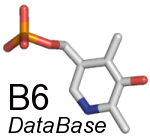|
|
| type |
Journal Article |
| authors |
Wang NC, Lee CY. |
| title |
Molecular cloning of the aspartate 4-decarboxylase gene from Pseudomonas sp. ATCC 19121 and characterization of the bifunctional recombinant enzyme |
| journal |
Appl Microbiol Biotechnol |
| Activity |
4.1.1.12 |
| Family |
4.1.1.12 |
| sel |
selected |
| ui |
16847601 |
| year |
(2006) |
| volume |
73 |
| number |
2 |
| pages |
339-48 |
| | |
|---|
| abstract |
L-Aspartate 4-decarboxylase (Asd) is a major enzyme used in the industrial production of L-alanine. Its gene was cloned from Pseudomonas sp. ATCC 19121 and characterized in the present study. The 1,593-bp asd encodes a protein with a molecular mass of 59,243 Da. The Asd from this Pseudomonas strain was considerably homologous to other Asds and aminotransferases, and has evolved independently of these enzymes from gram-positive microbes. Productivity rate of the C-terminal His-tagged fusion Asd was at 33 mg/l of Escherichia coli transformant culture. The kinetic parameters K (m) and V (max) of the fusion protein were 11.50 mM and 0.11 mM/min, respectively. Gel filtration analysis demonstrated that Asd is a dodecamer at pH 5.0 while 4.4 % of the recombinant protein dissociated into dimer when the pH was increased to 7.0. Asd exhibited its maximum activity at pH 5.0 and specific activity of 280 U/mg, and remained stable over a broad range of pH. The optimum temperature for Asd reaction was 45 degrees C, and 92 % of the activity remained when the enzyme was incubated at 40 degrees C for 40 min. This enzyme did not have any preferred divalent cation for catalysis. The recombinant Asd also exhibited aminotransferase activity when D,L-Asp, L-Glu, L-Gln, and L-Ala were utilized as substrates. However, the decarboxylation activity of L-aspartate was 2,477 times higher than its aminotransferase activity. The present study is the first investigation on the important biochemical properties of the purified recombinant Asd. |
| last changed |
2007/12/21 17:48 |
|











